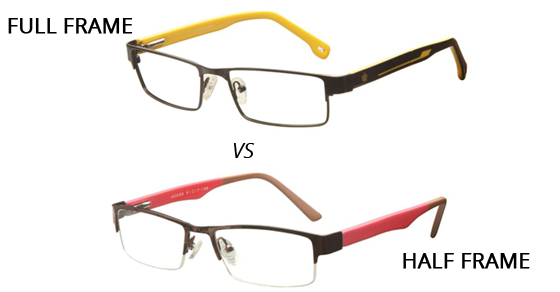One of the most common questions customers ask when shopping for a new pair of eyeglasses is whether they should get full frame or half frame glasses. Sure there’s loads of designs and colors available from pretty much every brand in the glasses business, but it all comes down to personal preference when we’re comparing full frame versus half frame glasses, or does it? Apart from the usual what looks better on whom, full frame and half frame glasses actually have a couple of other properties you must consider.
Before we get into the details however, just to refresh your memory, there are three basic designs of glasses. They are full frame, half frame and rimless. Each of them have their own advantages and disadvantages, and of course costs. Not every type can be used with all lenses and certain types might not be suitable for every demographic. Here’s a basic description of each:
- Full Frame Eyeglasses: The classic full frame implies glasses where the lenses completely encapsulated by a metal, plastic or polycarbonate frame. Here, the lenses are completely surrounded by the frame material.
- Half frame glasses: Half frame glasses, as the name suggests, only encircle half or a similar percent of the lenses. The other part of the lenses are usually left open or are attached to the frame by a strong fiber.
So are you wondering what type of frame to get for your next pair of glasses? We’ve got a guide that could help you out in that regard! As mentioned earlier, we’re mostly looking at factors like user demographic, daily usage, type of usage and more.
You Should Get Full Frame Glasses If:
- You like the classic full bodied look.
- You want to accentuate the appearance of your eyewear and like flaunting it.
- You predict that the glasses will go through a bit of wear and tear. This is especially important for younger users, since they’re not as careful with their glasses as adults are. If you’re buying glasses for your child, full framed glasses are definitely the best way to go.
- You don’t mind the extra weight. Full framed glasses are slightly heavier than their half frame counterparts simply because there’s more material, but then again, they’re also more robust. Of course, half frame metal glasses will weigh slightly more or around the same as full frame plastic glasses, so we’re looking at similar materials when we’re comparing weight.
- You need larger corrective lenses. Most half frame or rimless glasses cannot hold as thick lenses as full frame glasses can, by virtue of extra support. So if you have thick corrective lenses, you really don’t have a choice other than to go for a pair of full frame glasses.
- You don’t want to worry too much about maintenance.
To put it simply, full frame glasses are actually great for everyone. Both kids and adults can use them, plus they fit into a variety of lifestyles. If durability and low maintenance is what you’re looking for, look no further than full frame glasses. They’re not as delicate as the other two types and look good on pretty much all types of face structures. It’s the universal type!
You Should Get Half Frame Glasses If:
- You want to go for a more sophisticated and mature look.
- You prefer lighter frames, and don’t want to lug around too much weight on your nose.
- You wear your glasses for extended periods of time. Of course, you can also get lightweight full frame glasses, but lighter materials are usually a bit more expensive. So the easiest option would be to go for half frame glasses.
- Your correctional lenses aren’t too thick or too thin. Very thick lenses cannot be accommodated, and very thin lenses are prone to breakage.
- Your lifestyle isn’t too demanding. By which, we mean that if you spend most of the time in a non-sports or active environment where there’s a risk of falling or getting hit by some sort of equipment, you can consider half frame glasses. For example, you can’t give a 10 year old half frame glasses because they run, jump and play around, and are at a risk of damaging their glasses.
- You’re looking for a more exclusive pair, for outings and such.
Half frame glasses are recommended for adults and older teenagers, who don’t have to worry too much about running around and getting smacked in the face by a ball or something similar (unless you’re a sportsperson, of course). Most half frame glasses have lenses that are either stuck to the top frame or supported by a thin fiber at the bottom, so they are quite delicate. Improper usage can not only break the glasses, but can also possibly cause serious eye damage.
Then again, you can always get full frame glasses for daily use and half frame ones for going out, it’s up to you. Once you’ve decided what type of frame would suit you, make sure to check your lenses fit snugly, the frame is durable, and of course, if you’re getting your money’s worth! It’s always a good idea to try different materials and brands so that you can see which is the most comfortable. After all, it’s something you’ll have on for most of your day, so why compromise?



